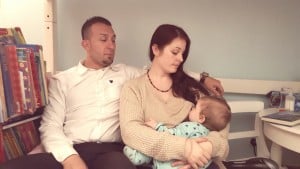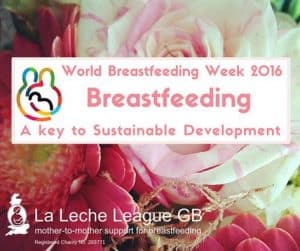Breastfeeding: A Key to Sustainable Development
In September 2015, at the United Nations Sustainable Development Summit, the world’s leaders committed to 17 goals aimed at ending poverty, protecting the planet and ensuring prosperity. These were called the Sustainable Development Goals (SDGs) and the hope is that they will be achieved by 2030.
Breastfeeding is a key element in wellbeing from the start of life and World Breastfeeding Week (WBW) 2016 looks at how it plays a part in all of the Sustainable Goals.
Nutrition, Food Security and Poverty Reduction
Exclusive breastfeeding and continued breastfeeding for two years and beyond can help to prevent hunger, undernutrition and obesity, providing high quality nutrients and energy. (Undernutrition is a form of malnutrition due to a deficiency of nutrients, leading to a weakened immune system and repeated infectious diseases.) Breastfeeding is a natural, low-cost way of feeding babies and children, giving them food security.
Artificial feeding places a large burden on household budgets while breastfeeding is affordable for everyone and, therefore, contributes to reducing poverty.
Survival Health and Wellbeing
Undernutrition, including less than optimal breastfeeding, is the underlying cause of 45% of all deaths of children under five annually 1. Breastfeeding improves the health, development and survival of children and contributes to the health and well-being of mothers. This is not just a short term effect, breastfeeding has long-term significance.
Along with good quality complementary foods, breastfeeding significantly contributes to mental and cognitive development and thus promotes learning 2.
Breastfeeding helps to reduce inequalities, particularly among poor and vulnerable groups, giving all children the optimal start in life. It offers protection when disasters and crises occur 3.
Read our post on Breastfeeding in Emergency Situations.
Women’s Productivity and Employment
Women and babies have a right to breastfeed and their rights should be upheld. Being in control of how she feeds her baby can be both satisfying and empowering for a mother. When mothers work outside the home, their right to breastfeed should be supported by employers and the community, as well as their own families. Legislation and policies are needed to protect and support breastfeeding 4.
Environment and Climate Change
Formula feeding requires access to clean water, hygiene and sanitation, and its manufacture uses valuable resources. It can lead to waste that pollutes the seas, while the dairy farming needed for formula production contributes to carbon emissions and climate change. Breastfeeding is sustainable, reduces the energy a family needs to use and produces far less waste than formula feeding. It’s a natural source of nutrition and sustenance. It provides both the food and water a baby needs, even in hot weather and during difficult times, such as natural disasters 5.
Promotion, Protection and Support
Breastfeeding provides the optimal start to life for all infants throughout the world. It safeguards their nutrition, and helps to protect the health and wellbeing of both babies and their mothers. During WBW, La Leche League GB would like to highlight the need for the promotion, protection and support of breastfeeding and the right of all women who wish to breastfeed their babies to do so. LLLGB volunteer breastfeeding counsellors are happy to offer this support to mothers every day of the year.
To see full details of the World Alliance for Breastfeeding Action’s (WABA) campaign for WBW go to:
http://www.worldbreastfeedingweek.org/index.shtml
For more information about LLLGB click here
1 Black RE et al: “Maternal and Child undernutrition and overweight in low-income and middle-income countries”, The Lancet, Volume 382, No. 9890, p. 427-451, August 20
2 Horta BL, de Mola CL, Victoria CG. Breastfeeding and Intelligence: systematic review and meta-analysis. Acta Peadiatr Suppl 2015
3 https://laleche.org.uk/supportingrefugeemothers/
4 https://laleche.org.uk/supporting-womens-right-to-breastfeed/
5 https://laleche.org.uk/breastmilk-and-the-environment/


